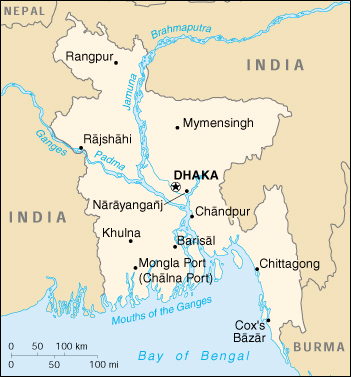Clan democracy
By Cedric Gouverneur
SINCE the end of the dictatorship in 1991, two clan-run parties have alternately held power in Bangladesh: the Awami League (AL) under Sheikh Hasina, and the Bengali Nationalist party (BNP) led by Khaleda Zia. Hasina is the daughter of Sheikh Mujibur Rahman, the first Bangladeshi head of state after independence in 1971, who was killed in 1975 together with his family in a pro-United States coup. Khaleda Zia is the widow of General Zia, who governed Bangladesh from 1976 until his assassination in 1981. Both women claim to be the heirs of their deceased relative, whom each claims was the founding father of Bangladesh.
Hatred of the opposition's leader is the main criterion for recruitment into each party's youth organisation, known for tyrannising streets and campuses.
On the political chessboard, the BNP is allied to the Islamists while the AL claims to be secular, but both are neoliberal and use similar practices. Both begums accuse each other of corruption and human rights violations.
In Bangladesh power signifies both money and immunity. Electoral defeat means considerable loss of revenue for the politician and his or her clan, hence the refusal to contemplate losing power. The opposition, whichever party it is, will boycott parliament and organise hartals (strikes), during which opponents may see their shops burned down, to trigger early elections. Bombs have been set off at opposition meetings as well as in NGO offices.
Vote buying is a common practice during elections. According to a poll in a Dhaka slum in 1999 by Bangladeshi political scientists, 17% of the electorate voted for the party that had given them free cigarettes, 10% had received soft drinks, 9% cash bribes; 12% were threatened. "In the village where I work a vote costs $1.55," says a western aid worker. "If the results don't match the payments, the mastaans will identify and punish those that haven't complied." Ignorance will do the rest. "During the campaign, the opposition's main argument was my alleged atheism," complains Firuz Ahmed, a lawyer for the poor and leftwing candidate for Khulna in 2001.
According to the United Nations, Bangladesh's literacy rate is 41%, so low that some people see it the result of a deliberate policy. "Illiteracy suits the elite, it enables them to manipulate people," says a Bangladeshi journalist. Political science posits that the middle class with its social aspirations in a stable environment is a major factor in democracy. Yet 80% of Bangladeshis are below the poverty line. In the streets of Dhaka the range of motor vehicles goes from beaten-up old buses to luxurious air-conditioned SUVs. The elite paralyse society but they are still elected. Strictly speaking, Bangladesh is a democracy.


